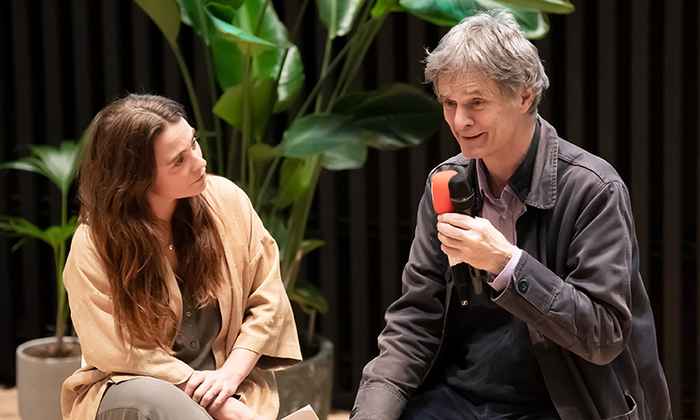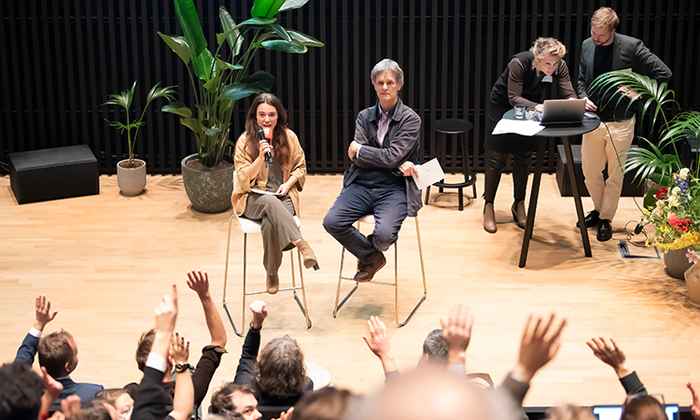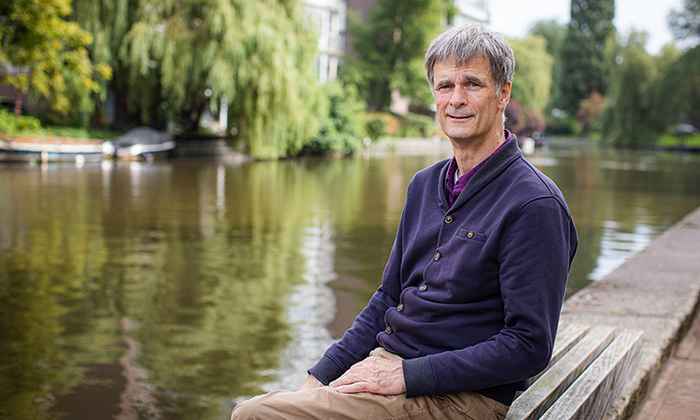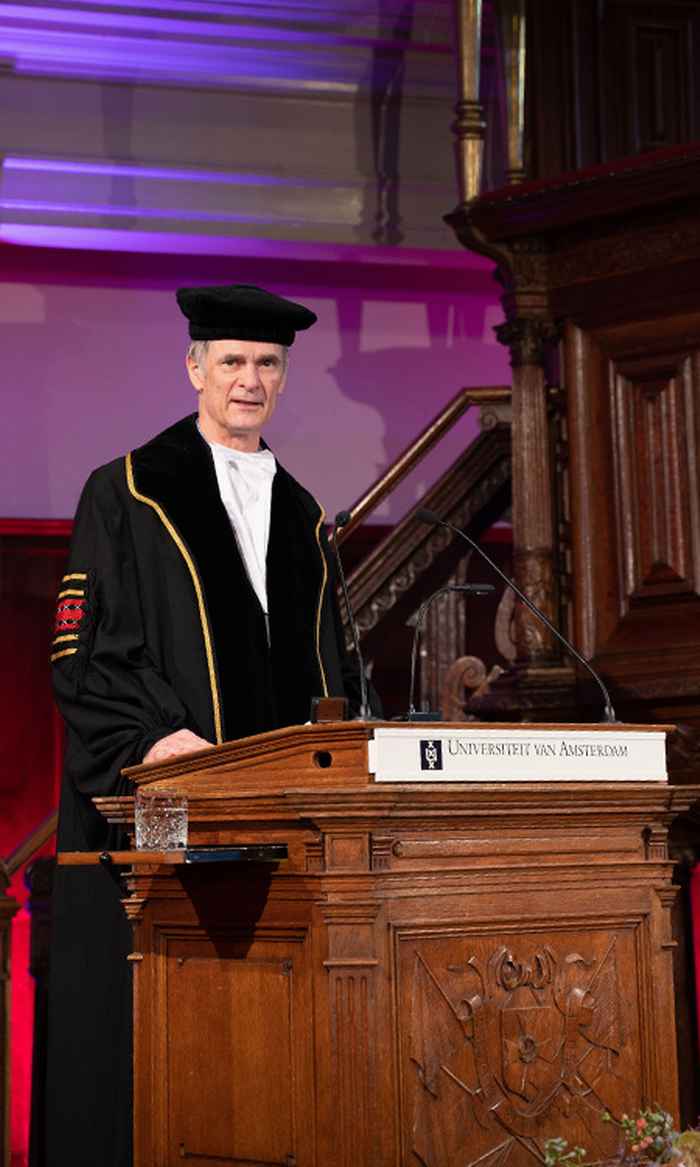"Do something big, make a push towards green, set that flywheel in motion, and then the government can step back."
Economic instruments to combat climate change
23 July 2025

With great ease and charm, he peppers his argument about the lack of market forces, the curse of raw materials, oil extraction in Suriname, and politics in The Hague with anecdotes about eating cakes with the late Pim Fortuyn, the fun of intellectual cross-pollination, and his love of theatre performances in London and his home in Dorset: "Jane Goodall lives around the corner."
Rick van der Ploeg has been an advocate of CO2 taxes since the 1970s/1980s and remains a strong proponent of them. Rick: "Provided that the proceeds are distributed in such a way that there is support among those with low incomes, both individuals and countries, who are unfortunately often the hardest hit by climate change." He is therefore in favour of a climate dividend: "You give everyone a lump sum, a fixed amount of money, which is relatively more valuable to people on low incomes, thereby offsetting the regressive effect of CO2 taxes."
If you take both recurring disasters and tipping points into account, you end up with more than a thousand dollars per tonne of CO2.
One of his specialisms is calculating the price of CO2 emissions, which lead to increased risks of climate-related natural disasters and irreversible tipping points. Rick: "Nobel Prize winner William Nordhaus once said that a tonne of CO2 should cost fifteen dollars; later, he mentioned a figure of fifty dollars. A recent article in Nature now mentions a figure of two hundred dollars per tonne of CO2, but if you take both recurring disasters and tipping points into account, you end up with more than a thousand dollars per tonne of CO2."
The fight against brown subsidies
He is also interested in the Carbon Border Adjustment Mechanism: a tax on polluting products at the European border. Rick: "The problem now is that the biggest polluters pay nothing; they are simply exempt. A large part of the more than forty billion euros in brown subsidies that Extinction Rebellion is fighting against consists of these kinds of exemptions."
He believes that taxes at the European border are the best solution and these should be introduced in a year or two. Rick: "Politicians are now being pressured by companies in Europe not only to maintain the exemptions after introduction, but also to give them vast amounts of public money. But that's a double whammy, because the border tax creates a level playing field and allows you to tax every company in Europe for its CO2 emissions, as it should be.

Rick: "If you were to price oil and gas emissions according to the damage they cause, you would change the incentives to extract fossil fuels from the ground. You know that famous quote, 'The Stone Age did not end because the world ran out of stones, and the oil age will not end because we run out of oil'? That's because an era like that comes to an end when better alternatives, such as solar and wind energy, become available. There are a lot of start-ups that could be profitable but are being held back by those brown subsidies and a lack of pricing for emissions. New technology does not just appear out of thin air; it also responds to price incentives! And pricing CO2 leads companies and households to replace brown inputs and consumer goods with green ones.”
Big Push Policy
According to Rick, it is not enough to make the "brown equilibrium" in which the economy currently finds itself a little greener; we need to move towards a completely different form of economy. And that requires a significant, temporary intervention, a Big Push Policy. Rick: "Once people have an electric car or heat pump, they are not going back. And the more people switch, the less attractive and more expensive it becomes to stick with the old, brown technologies, such as diesel cars or gas boilers. Also, doubling the number of installed solar panels, windmills or batteries has led historically to cost reductions of at least twenty percent."

When asked what he would advise the Dutch government, he replies: "Do everything you can to get the Dutch to switch to new, clean technology. Do something big, make a big push towards green, set that flywheel in motion, and then the government can step back. I think that's a much more appealing narrative than that of a permanent stream of small green subsidies. While these do lead to lower emissions, they don't necessarily ensure that people actually switch to green technology.”
Risks of the transition and lack of knowledge
According to Rick, central banks, insurers and banks such as ABN Amro with Sandra Phlippen are miles ahead of governments: "With a single speech entitled 'Breaking the tragedy of the horizon - climate change and financial stability', Mark Carney, then head of the Bank of England, now Prime Minister of Canada, managed to shift the course of that entire network of some 300 central banks. Central banks are aware that a green transition could lead to the collapse of several banks, for instance, because they hold mortgages on houses in areas vulnerable to flooding and the increased incidence of natural disasters. When you compare that with the European ministries of economic affairs, you think: something strange is going on. How is it possible that the so-called bad financial sector is paying much more attention to the green transition?"
He is outspokenly critical of the possible lack of knowledge about the green transition and its risks among some pension funds. Rick: "Brown shares yield more dividends than green shares, because otherwise the pension funds would no longer want them. The price of brown shares is relatively low, so the return is relatively high to compensate the market for the transition risk: the risk that share prices will plummet when the inevitable switch to a green policy takes place. Some of the most important pension funds, responsible for our investments, are unable to make these kinds of basic financial calculations, which are child's play for any first-year finance student. I find that sad."
More revolutionary than degrowthers in some respects
When asked about his opinion on the concept of "degrowth", shrinking the economy to reverse climate change and protect the environment, he cautiously formulates his answer. Rick: "I am a big supporter of degrowth, because it's one minute to midnight and there is a limit to adaptation, and emissions must stop. But I still see degrowthers primarily as an interesting sect, because they don't always base their views on research. On some points, I would like to be more revolutionary than they are. Degrowth is not enough for the brown sectors; they must be reduced to zero immediately. They simply cannot continue to exist, because as long as they do, emissions and therefore global warming will continue!"
However, according to him, other sectors, such as healthcare, education, culture, and the entertainment and green tourism industries, should grow, provided they are sustainable. Rick: “If you price the brown sector sufficiently, new green technologies and sectors will emerge. Consider how affordable solar energy has become. Its price has fallen from $100 per watt in 1976 to a few cents per watt today! And in the great revolution of the next five to ten years, the marginal cost of energy will fall to zero, leaving only fixed costs."

When asked whether scientists such as David Suzuki are not simply correct in their assertion that we cannot use the economy and market forces to save the planet, because they are the very cause of the problem, and that you cannot have unlimited growth in a limited world, he responds resolutely: "This awkward situation is precisely the result of a lack of market forces! And of rotten monopolies, often maintained by politicians and former politicians. In a real market economy, industry would have had to pay the price for the damage caused to the planet and humanity!"
He adds that pure market forces in sectors such as healthcare and universities, would of course be "absurd": "There are many areas where the market cannot work and the visible hand of government is required."
Intellectual cross-pollination
The conversation with Rick takes place online. He lives mainly in England, the country where his mother comes from and where he studied and still works. His pension records indicate that he has spent about the same amount of time in the UK as in The Netherlands. He likes the fact that the UvA is not only a top university but also a "city university”, and he appreciates its efforts to constantly seek common ground with the city and carry out projects there. And in Oxford, he greatly enjoys the daily encounters within his department with highly diverse scholars.
In Oxford, for example, you might suddenly find yourself sitting next to Richard Dawkins, the great evolutionary biologist, or next to a famous mathematician or a lady who knows everything about Casanova and liberal attitudes towards eroticism in French poetry.
Rick: "In Oxford, for example, you might suddenly find yourself sitting next to Richard Dawkins, the great evolutionary biologist, or next to a famous mathematician or a lady who knows everything about Casanova and liberal attitudes towards eroticism in French poetry." In Amsterdam he misses the diversity of people he meets in Oxford during lunch or dinner: "At the UvA it’s less easy to meet someone who is involved in literature or theatre or, for example, a reviewer for The Guardian, because they happen to be sitting next to you. It's unintentional, unplanned, and then I think: that was a gift."
He says in Amsterdam he meets less scholars outside his department, and even fewer outside his faculty. That's why he's so happy with the Institute for Advanced Study (IAS) and the establishment of the SEVEN climate institute. As an example of its importance, he mentions his contact with professor and Spinoza Prize winner Joyeeta Gupta: "A fantastic woman. We work on the same topics but in completely different ways. She has a more socio-geographical perspective, delving into the broader picture and policy, and possesses a detailed knowledge of the countries themselves. Hardcore economists should honour honour these kinds of people, because they're different from you, and you can learn a lot from them. You have to dare to look beyond your discipline and be open-minded."
He adds honestly: "I encounter this in my own work too. The way sociologists work on tipping points, for example, is different from how I do it, but at the IAS and elsewhere at the UvA, this leads to discussions and better ideas."
Elles Tukker